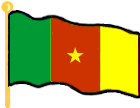Miyaka Weh
Nyango sent this song with the note: "Cameroonian adults sing all the time. We sing while working - hunting, farming, cooking, cleaning around the home, etc. We actually whistle in the dark or while walking through the forest/farm, sometimes to let others who are nearby but out of sight to know that there is another human being nearby. And this helps seeing how dense our forests/grass can be and how dark our nights get to be in the tropics, so that anybody hearing movement in the dark or in the forest knows it is a human being not an animal. It also prevents accidental shooting for hunters hunting, and lets any other human being know that there is another person out there. Our farms can be very large and far apart but a singing voice carries, so you don't feel alone. Singing also helps us work faster and/or gives us the momentum to work longer hours than we would if we just worked silently.
We have songs for almost all occasions. I spent my childhood in several parts of Cameroon and I can remember one song of encouragement to women working on the farm or returning from the harvest carrying bundles of food or wood on their heads. Any passer-by seeing them will call out, and if the women were farming they actually stopped for a minute to sing out in response…"
Miyaka Weh
Good Job
Children's Song
Children's Song
(Metta)
(English)
Passerby: "Miyaka weh"
Women working: "O-na-o!
O-na-o!
O na, o na, o-na o!
O-na-o!"
Passerby: "Miyaka weh"
Women working: "O-na-o!
O-na-o!
O na, o na, o-na o!
O-na-o!"
Notes
Nyango said: "The song is in the Metta language. "Miyaka" actually means "thank you" and also suggests "well done", "good job" or something like that. I find it hard to find an exact English equivalent."
Later Nyango wrote:
"Most of the songs do cross over from adults to children since parents are the ones who teach the kids to sing. You would never hear Cameroonian children singing bawdy songs - the adults do not tolerate that. The song I wrote earlier today about women working was such a delight to us that as children, we always sang out to the women just to hear them answer back. And then sometimes we just sat around and sang it. So, I really am not sure if this qualifies as a children's song or an adult song."
Thanks and Acknowledgements
Many thanks to Nyango M. Nambangi of the Minnesota African Women's Association for contributing this song and for telling us about the singing traditions in Cameroon.
Thanks so much!

























